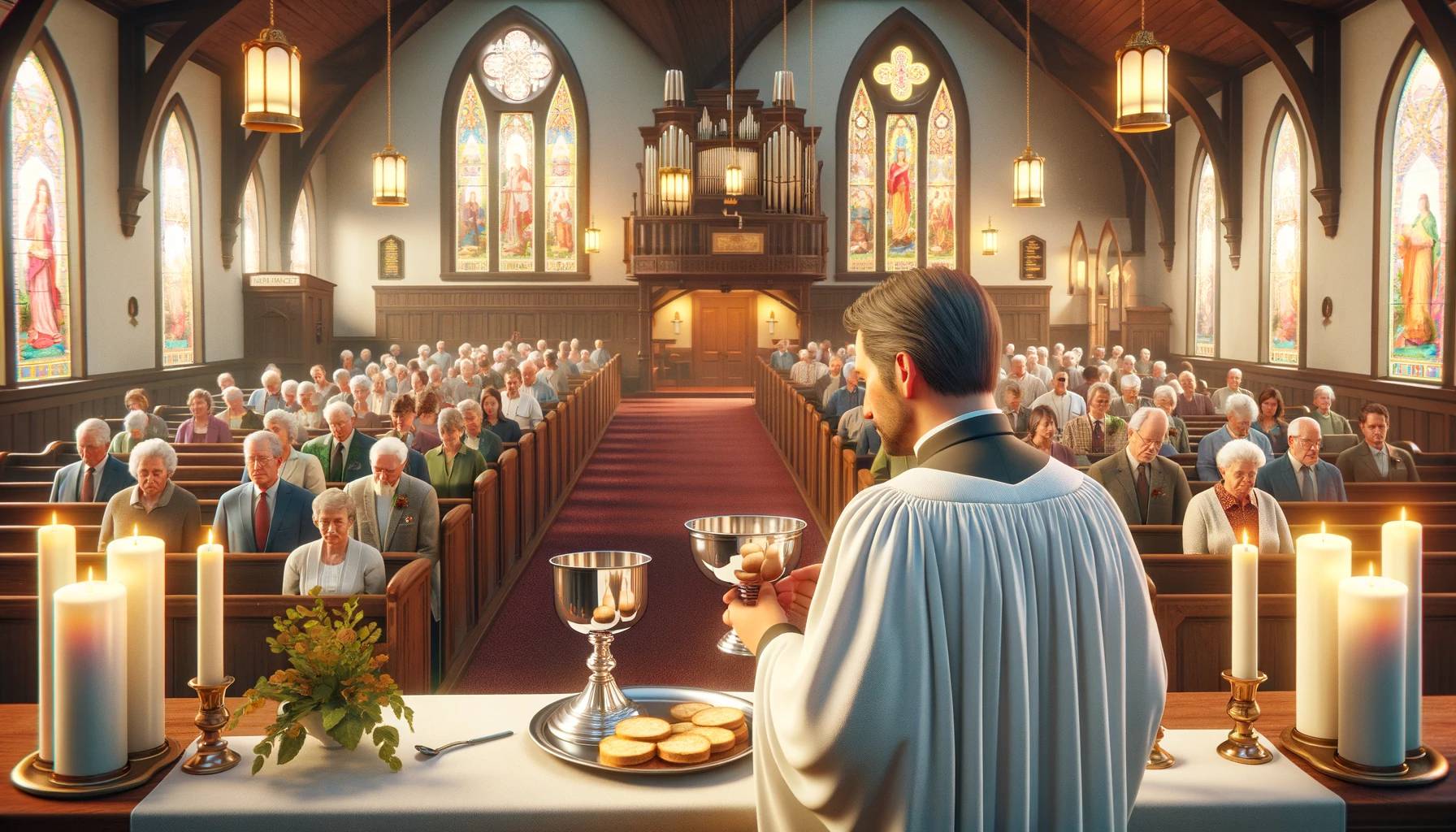Home>Theology and Spirituality>How Often Does The Bible Say To Have Communion


Theology and Spirituality
How Often Does The Bible Say To Have Communion
Published: February 19, 2024
Peter Smith, Editorial Director at Christian.net, combines deep insights into faith, politics, and culture to lead content creation that resonates widely. Awarded for his contributions to religious discourse, he previously headed a major organization for religious communicators, enhancing dialogue on faith's societal impacts.
Discover the frequency of communion in the Bible and its significance in theology and spirituality. Uncover the scriptural guidance on partaking in communion.
(Many of the links in this article redirect to a specific reviewed product. Your purchase of these products through affiliate links helps to generate commission for Christian.net, at no extra cost. Learn more)
Table of Contents
Introduction
Communion, also known as the Lord's Supper or the Eucharist, holds profound significance in Christian faith and practice. It is a sacred ritual that symbolizes the body and blood of Jesus Christ, commemorating his sacrificial death and celebrating the new covenant between God and humanity. The act of partaking in communion is deeply rooted in the teachings of the Bible and has been a central aspect of Christian worship for centuries.
In this comprehensive exploration, we will delve into the biblical and historical foundations of communion, examining its prevalence in both the Old and New Testaments. We will also consider the frequency of communion in the early church and how modern perspectives on this practice have evolved over time. By gaining a deeper understanding of the scriptural and historical contexts surrounding communion, we can appreciate its enduring significance and relevance in the lives of believers today.
The Importance of Communion in the Bible
The importance of communion in the Bible is deeply rooted in the teachings and traditions of Christianity. At its core, communion symbolizes the sacrificial death of Jesus Christ and the establishment of the new covenant between God and humanity. This sacred ritual holds profound significance for believers, serving as a tangible expression of their faith and a means of spiritual nourishment.
Central to the significance of communion is its representation of the body and blood of Jesus Christ. During the Last Supper, a pivotal event recounted in the New Testament, Jesus shared bread and wine with his disciples, instructing them to partake in remembrance of him. This act of sharing the elements of bread and wine symbolized the impending sacrifice of Jesus' body and the shedding of his blood for the redemption of humanity. As such, communion serves as a powerful reminder of the atoning work of Christ and the profound love and grace extended to believers through his sacrifice.
Furthermore, communion embodies the concept of unity within the body of Christ. As believers partake in the elements together, they are reminded of their shared identity as members of the Christian community. The act of coming together to participate in communion fosters a sense of fellowship, mutual support, and spiritual interconnectedness among believers. It reinforces the idea of being part of a larger spiritual family, bound together by a common faith and a shared commitment to following the teachings of Jesus Christ.
Moreover, communion serves as a source of spiritual nourishment and renewal for believers. In partaking of the bread and wine, believers are invited to reflect on their relationship with God, seek forgiveness for their shortcomings, and recommit themselves to living in accordance with the teachings of Jesus. The act of communion offers a sacred moment for introspection, repentance, and the reaffirmation of one's faith, providing a means for believers to experience spiritual rejuvenation and a deepening of their connection with God.
In summary, the importance of communion in the Bible is multifaceted and profound. It embodies the sacrificial love of Jesus Christ, fosters unity within the Christian community, and provides a source of spiritual nourishment and renewal for believers. As we delve into the biblical and historical foundations of communion, we gain a deeper appreciation for its enduring significance and relevance in the lives of Christians throughout the ages.
Instances of Communion in the Old Testament
In the Old Testament, instances of communion, as understood in the Christian tradition, are prefigured through various rituals and practices that foreshadow the spiritual significance attributed to communion in the New Testament. While the term "communion" may not be explicitly used in the Old Testament, there are symbolic and prophetic elements that resonate with the themes embodied in the Christian understanding of communion.
One notable instance is found in the book of Genesis, where the narrative of Melchizedek, the king of Salem and a priest of God Most High, provides a foreshadowing of communion. In Genesis 14:18-20, Melchizedek brought out bread and wine and blessed Abram, signifying a sacred encounter that resonates with the elements later associated with the Last Supper in the New Testament. This encounter carries symbolic significance, hinting at the future redemptive work of Christ and the establishment of a new covenant.
Additionally, the Old Testament features various sacrificial rituals and feasts that hold typological relevance to the concept of communion. The Passover, a central observance in Jewish tradition, involved the consumption of a sacrificial lamb and unleavened bread, symbolizing deliverance and the establishment of a covenant relationship with God. These elements bear resemblance to the bread and wine used in communion, signifying spiritual nourishment and the covenantal relationship between God and his people.
Furthermore, the imagery of communal meals and offerings in the Old Testament underscores the themes of fellowship and spiritual sustenance, echoing the communal aspect of communion in the New Testament. The shared meals and offerings served as occasions for communal worship, thanksgiving, and the reaffirmation of the covenantal relationship with God, foreshadowing the communal aspect of partaking in the Lord's Supper within the Christian faith.
While the Old Testament does not explicitly delineate the practice of communion as observed in the New Testament, it lays a foundational framework through symbolic and prophetic elements that anticipate the redemptive work of Christ and the spiritual significance attributed to communion. These instances provide a rich tapestry of foreshadowing and typological elements that contribute to the profound continuity between the Old and New Testaments, illuminating the enduring spiritual themes embodied in the practice of communion.
Instances of Communion in the New Testament
The New Testament provides pivotal accounts of communion, particularly through the narratives of the Last Supper as recorded in the Gospels and the teachings of the apostle Paul. These accounts serve as foundational references for the practice of communion within Christian tradition, offering profound insights into its significance and observance.
The most renowned instance of communion in the New Testament is the Last Supper, a momentous event that took place during the Passover feast. Described in the synoptic Gospels of Matthew, Mark, and Luke, and also referenced in the writings of the apostle Paul, the Last Supper marks the occasion when Jesus shared a meal with his disciples before his crucifixion. During this intimate gathering, Jesus took bread, blessed it, broke it, and gave it to his disciples, declaring, "Take, eat; this is my body." He then took the cup, gave thanks, and offered it to his disciples, saying, "Drink from it, all of you; for this is my blood of the covenant, which is poured out for many for the forgiveness of sins." These profound actions and words form the essence of communion, symbolizing the sacrificial nature of Jesus' impending death and the establishment of the new covenant.
The apostle Paul further expounds on the significance of communion in his first letter to the Corinthians. In 1 Corinthians 11:23-26, Paul provides a detailed account of the Last Supper, emphasizing the solemnity and reverence with which the ritual should be observed. He underscores the importance of partaking in communion in a manner that reflects genuine remembrance of Christ's sacrifice and a discerning recognition of its spiritual significance.
The narratives of the Last Supper and Paul's teachings in 1 Corinthians highlight the centrality of communion in the New Testament, portraying it as a sacred and transformative practice that embodies the redemptive work of Christ and the covenantal relationship between God and believers. These instances serve as foundational references for the observance of communion within Christian communities, shaping the understanding and significance of this sacred ritual for generations of believers.
In essence, the New Testament provides profound instances of communion that underscore its pivotal role in Christian faith and practice. The narratives of the Last Supper and the apostle Paul's teachings offer rich insights into the spiritual significance and observance of communion, shaping its enduring importance within the Christian tradition.
Frequency of Communion in the Early Church
In the early Christian church, the frequency of communion held significant importance as a central aspect of worship and spiritual fellowship. The practices surrounding the observance of communion varied across different regions and communities, reflecting diverse cultural and theological influences. However, several key patterns and principles emerged regarding the frequency of communion in the early church.
One notable aspect of communion in the early church was its close association with the communal gatherings of believers. The early Christians often partook in communion as part of their regular gatherings for worship, prayer, and the teaching of the apostles' doctrine. These communal gatherings, often held in homes or designated meeting places, provided a sacred context for believers to come together, share in the Lord's Supper, and strengthen their bonds of fellowship and mutual support.
The Acts of the Apostles provides insights into the early church's practice of communion, depicting a community characterized by its devotion to the breaking of bread and fellowship. Acts 2:42 describes how the early believers devoted themselves to the apostles' teaching, fellowship, the breaking of bread, and prayer, indicating that communion was an integral part of their regular gatherings. This emphasis on the breaking of bread as a communal practice suggests that communion was observed with a notable degree of frequency, likely as part of the believers' shared worship and spiritual nourishment.
Furthermore, the writings of the apostle Paul offer additional perspectives on the frequency of communion in the early church. In 1 Corinthians 11:18-22, Paul addresses issues related to the Corinthian church's observance of the Lord's Supper, highlighting the communal nature of the ritual and its significance within the context of their gatherings. While Paul's admonitions primarily focus on the manner of partaking in communion, his instructions imply that the Corinthian church engaged in the practice with a degree of regularity, aligning with the communal and spiritual significance attributed to the ritual.
The early church fathers and early Christian writings also provide glimpses into the frequency of communion in the early church. The Didache, an early Christian document dating to the late first or early second century, contains instructions for the observance of the Eucharist, indicating that communion was a central feature of Christian worship and was likely observed with a degree of regularity.
Overall, the frequency of communion in the early church was characterized by its close association with communal gatherings, the breaking of bread as a shared practice, and its significance within the context of worship and spiritual fellowship. While specific details regarding the exact frequency of communion may have varied across different communities, the early church's devotion to the observance of the Lord's Supper underscores its central role in shaping the spiritual life and communal identity of believers in the formative years of Christianity.
Read more: How Often Do Catholics Have Communion
Modern Perspectives on the Frequency of Communion
In contemporary Christian practice, diverse perspectives exist regarding the frequency of communion within worship services. The approach to how often communion should be observed varies among denominations, local congregations, and individual believers, reflecting a range of theological, historical, and practical considerations.
Some Christian traditions emphasize the regular and frequent observance of communion as a central component of their worship services. For these traditions, communion is often celebrated weekly, with the belief that frequent participation in the Lord's Supper fosters spiritual nourishment, communal unity, and a deepened sense of the presence of Christ in the worshiping community. This perspective aligns with the understanding of communion as a sacred and transformative practice that holds profound significance for the spiritual life of believers.
Conversely, other Christian denominations and congregations may observe communion less frequently, such as on a monthly or quarterly basis. This approach may stem from theological considerations, practical considerations related to the size and structure of the congregation, or historical traditions within a particular faith community. While less frequent observance, the significance and reverence accorded to communion remain central, with a focus on ensuring that the ritual is approached with deep reverence and spiritual intentionality.
Additionally, modern perspectives on the frequency of communion are influenced by the broader shifts in worship practices and ecclesiastical trends within contemporary Christianity. Some churches and denominations have revisited the question of communion frequency in light of evolving understandings of worship, community dynamics, and the spiritual needs of congregants. This has led to a reevaluation of traditional practices and a reconsideration of how the observance of communion can best serve the spiritual formation and communal life of believers in a modern context.
Furthermore, individual believers within diverse Christian traditions may hold personal perspectives on the frequency of communion based on their spiritual experiences, theological convictions, and the dynamics of their faith communities. This diversity of perspectives reflects the richness and complexity of the Christian tradition, encompassing a spectrum of approaches to the observance of communion that resonate with the diverse spiritual journeys and communal expressions of faith among believers.
In essence, modern perspectives on the frequency of communion encompass a spectrum of practices and beliefs, reflecting the diverse theological, historical, and practical considerations within contemporary Christian worship. While differing in frequency, the observance of communion remains a central and cherished aspect of Christian worship, embodying the enduring significance of the Lord's Supper within the spiritual life of believers.
Conclusion
In conclusion, the practice of communion, deeply rooted in the teachings of the Bible and the traditions of Christianity, holds profound significance for believers. From its symbolic representation of the body and blood of Jesus Christ to its embodiment of unity within the body of Christ, communion stands as a sacred ritual that embodies the sacrificial love of Christ, fosters fellowship and spiritual nourishment, and serves as a source of renewal for believers.
The exploration of communion in the Old Testament revealed symbolic and prophetic elements that foreshadow the spiritual significance attributed to communion in the New Testament. Instances such as the encounter with Melchizedek and the typological relevance of sacrificial rituals and communal meals provided a foundational framework that anticipates the redemptive work of Christ and the enduring spiritual themes embodied in the practice of communion.
In the New Testament, pivotal accounts of the Last Supper and the teachings of the apostle Paul underscore the significance and observance of communion within Christian tradition. These instances serve as foundational references that shape the understanding and importance of this sacred ritual for generations of believers, emphasizing its centrality in Christian faith and practice.
The early church's devotion to the breaking of bread and fellowship, as depicted in the Acts of the Apostles and the writings of the apostle Paul, highlights the communal and spiritual significance of communion, shaping the spiritual life and communal identity of believers in the formative years of Christianity.
Modern perspectives on the frequency of communion reflect diverse theological, historical, and practical considerations, leading to a spectrum of practices and beliefs within contemporary Christian worship. Whether observed weekly, monthly, or quarterly, the significance and reverence accorded to communion remain central, emphasizing its enduring importance within the spiritual life of believers.
Ultimately, communion stands as a timeless expression of faith, unity, and spiritual nourishment, bridging the sacred narratives of the Old and New Testaments with the diverse expressions of Christian worship and community life. As believers partake in communion, they are invited to remember the sacrificial love of Christ, embrace the fellowship of the Christian community, and experience spiritual renewal, affirming the enduring relevance and significance of this sacred ritual in the lives of believers today.














